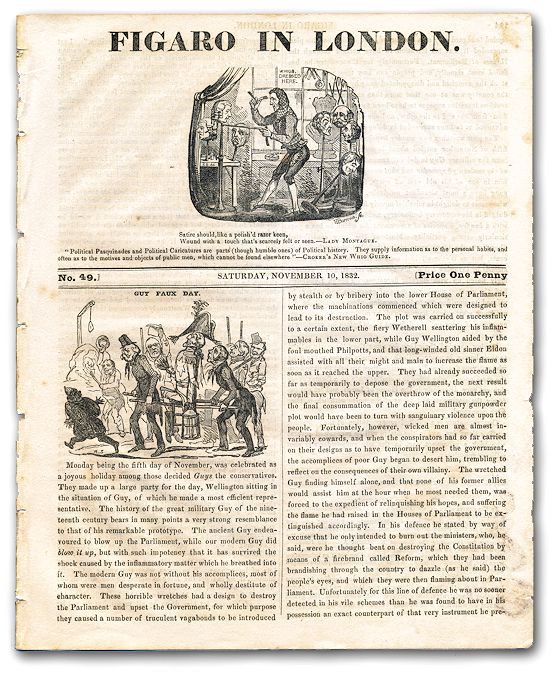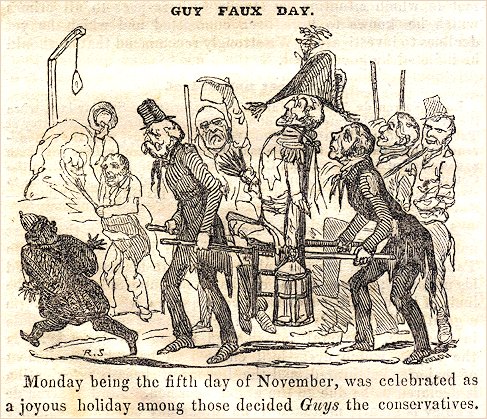 |
|
| News About Us Membership Events Links |
|

Figaro In London
Figaro in London, a four page comic paper, was founded in 1831. Written and edited by Gilbert Abbott à Beckett the periodical's leading articles would be "principally good-humoured squibs on passing events of primary popular interest". The caricaturist was Robert Seymour, a British illustrator known for his illustrations of the works of Charles Dickens. 
The main article, Guy Faux Day, depicts the Duke of Wellington sitting in the situation of the Guy. The article draws parallels with "the ancient Guy who endeavoured to blow up the Parliament, while our modern Guy did blow it up, but with such impotency that it has survived the shock caused by the infammatory matter which he breathed into it". The Duke of Wellington resigned on the question of Parliamentary reform in 1830. The Whigs returned to power, with Earl Grey as Prime Minister, determined to drive through sweeping changes by increasing the number of people who could vote. In 1831 the House of Lords rejected the Reform Bill. This rejection led to rioting around the country. Charles Greville, the diarist, recorded in his journal of 10 October 1831: Yesterday morning the newspapers (all in black) announced the defeat of the Reform Bill by a majority of forty-one, at seven o'clock on Saturday morning, after five nights' debating. By all accounts the debate was a magnificent display, and incomparably superior to that in the House of Commons, but the reports convey no idea of it. The Duke of Wellington's speech was exceedingly bad; he is in fact, and has proved it in repeated instances, unequal to argue a great constitutional question. He has neither the command of language, the power of reasoning, nor the knowledge requisite for such an effort. Increasingly frustrated by attempts to get to get the Reform Bill passed in the House of Lords, Grey's goverment resigned. William IV who had been unhelpful in assisting the Bill's passage then asked the leader of the Tories, the Duke of Wellington, to form a new government. Wellington was unsuccessful in persuading important figures in the party to join his cabinet, including Sir Robert Peel, who maintained should the King and Wellington press forward with their plans there there was a likelihood of civil war in Britain. The King had to capitulate and asked Grey to return to office. What became know as as the Great Reform Act was passed on 4 June 1832. In a further extract from the political satire in this issue "Guy Wellington" is cruelly reprimanded for his actions: Fortunately for the country he has failed most signally, and people can now treat as a laughing stock the wretched and disappointed gang by which the ruin of the country was at one time more than contemplated. Their reckless intention appears to have been to set the kingdom in a flame from one end to the other, and one of the gang had so far advanced as to have succeeded in doing so at Bristol. The poor wretches now wander hopelessly about, and on the fifth of November carried about in mournful procession their hero the military Guy in doleful remembrance of the failure of the modern gunpowder and shot conspiracy.
|
|
|
Home | News | About Us | Membership | Events | Links | Contact | Item of the month | Articles |
| Copyright © The Ephemera Society 2025. All Rights Reserved. |